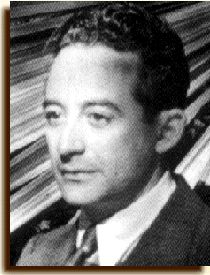

Nació y murió en la Ciudad de México, 1903-1951. Dirigió, con Salvador Novo, la revista Ulises (1927-1928) y formó parte del grupo de la revista Contemporáneos (1928-1931). Posteriormente fue redactor de El Hijo Pródigo (1943-1946). Fue becario de la fundación Rockefeller en la Universidad de Yale. Como poeta, evolucionó muy pronto de una percepción simple de la poesía a concepciones en que la alucinación, el sentido de la noche, el tema de la muerte, habrían de señorear en la porción más importante de su obra. En sus mejores momentos, la representación plástica de las emociones —particularmente en sus "nocturnos"— proporcionó uno de los aspectos definidos de su sensibilidad. Poco ejemplos se aprecian en la historia de nuestra lírica en que la fidalidad a la angustia y la predilección por la soledad hayan producido con tal eficacia esas muestras de la más auténtica emoción. Su influencia ha sido decisiva en el desarrollo posterior de la poesía mexicana.*
Toda su producción poética está recogida en Obras (1966). Eliot Weinberger tradujo al inglés una recopilación de su poesía bajo el título Nostalgia for Death (Copper Canyon Press, 1993). La traducción francesa que aquí se presenta proviene de Nostalgie de la mort, traducción de Jacques Ancet, José Corti, París, 1991. La traducción italiana proviene de Rojo de vida, negro de muerte, traducción de Carlo Coccioli y Tullio Ristori, Jester Libri, Boloña, 1969.
The founder of the first experimental theater group in Mexico City, Xavier Villaurrutia is well known in Mexico as a dramatist, especially as the author of the play Invitación a la muerte (Invitation to Death, 1943). Internationally he is better known as a poet of Rilkean complexity, solitude, and "nocturnal" Romanticism. The disjunction in his reputation, however, reflects an artificial distinction. In fact, Villaurrutia's dramatic interests influenced his poems, which often imply dramatic tensions and scenatios through dispassionate, submerged narratives. With the poet José Gorostiza, Villaurrutia was one of the founding members of the review Ulises (1927-1928), which promoted many of the ideals of the Contemporáneos group. Resisting the nationalist fervor of postrevolutionary Mexico, writers of the Contemporáneos group advocated instead a poetry of emotional intensity, transcendence, and verbalism and a passionate embrace of the shadow side of life. He was a man of great intellect, wit, and personal loyalty. Late in life, Villaurrutia also taught at the National University in Mexico City and served as director of the Bellas Artes theater program.
Recent critical readings of Villaurrutia's poems have valued his nocturnal and deathly serene poems less than his poems of homoerotic energy and love. Eliot Weinstein characterizes Villaurrutia’s process in terms that associate both those patterns of his poems: "Technically, he took the prosody and many of the themes of modernismo… and stripped its high-flown rhetoric to the natural, condensed, and playful speech of the Spanish vanguardia… But most of all, he was one of the great poets of desire: one whose beloved, finally, is not another man but Death itself, Death himself."*
The English translations here presented come from Nostalgia for Death, edited by Eliot Weinberger (Copper Canyon Press, 1993), except for the one of "Amor condusse noi ad una Morte", by Rachel Benson (Nine Latinamerican Poets, Las Americas Publishing Co., New York, 1968).
Links a otras páginas sobre Xavier Villaurrutia